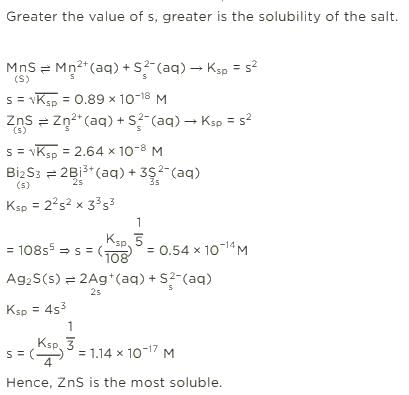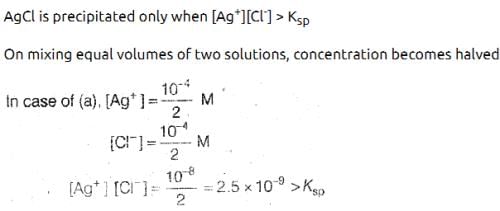Test: Ionic Equilibrium - NEET MCQ
30 Questions MCQ Test NCERT Based Tests for NEET - Test: Ionic Equilibrium
Out of the following, amphiprotic species are
I : HPO32-
II OH-
III H2PO4-
IV HCO3-
1 c.c. of 0.1N HCl is added to 99 CC solution of NaCl. The pH of the resulting solution will be
10 ml of is mixed with 40 ml of
. The pH of the resulting solution is
If pKb for fluoride ion at 25°C is 10.83, the ionisation constant of hydrofluoric acid in water at this temperature is :
The pH of an aqueous solution of 1.0 M solution of a weak monoprotic acid which is 1% ionised is:
If K1 & K2 be first and second ionisation constant of H3PO4 and K1 >> K2 which is incorrect.
The degree of hydrolysis of a salt of weak acid and weak base in it's 0.1 M solution is found to be 50%. If the molarity of the solution is 0.2 M, the percentage hydrolysis of the salt should be
What is the percentage hydrolysis of NaCN in N/80 solution when the dissociation constant for HCN is 1.3 × 10-9 and Kw = 1.0 × 10-14
Which of the following solution will have pH close to 1.0 ?
The ≈ pH of the neutralisation point of 0.1 N ammonium hydroxide with 0.1 N HCl is
If equilibrium constant of
CH3COOH + H2O CH3COO- + H3O+
Is 1.8 × 10-5, equilibrium constant for
CH3COOH + OH- CH3COO- + H2O is
If 40 ml of 0.2 M KOH is added to 160 ml of 0.1 M HCOOH [Ka = 2 × 10-4]. The pOH of the resulting solution is
A solution with pH 2.0 is more acidic than the one with pH 6.0 by a factor of :
The first and second dissociation constants of an acid H2A are 1.0 × 10-5 and 5.0 × 10-10 respectively.
The overall dissociation constant of the acid will be:
An aqueous solution contains 0.01 M RNH2 (Kb= 2 × 10-6) & 10-4 M NaOH.
The concentration of OH- is nearly:
What volume of 0.2 M NH4Cl solution should be added to 100 ml of 0.1 M NH4OH solution to produce a buffer solution of pH = 8.7 ?
Given : pKb of NH4OH = 4.7 ; log 2 = 0.3
The pKa of a weak acid, HA, is 4.80. The pKb of a weak base, BOH, is 4.78. The pH of an aqueous solution of the corresponding salt, BA, will be:
The range of most suitable indicator which should be used for titration of X - Na+ (0.1 M, 10 ml) with 0.1 M HCl should be ( Given : kb(X-) = 10-6 )
How many gm of solid NaOH must be added to 100 ml of a buffer solution which is 0.1 M each w.r.t. Acid HA and salt Na+ A- to make the pH of solution 5.5. Given pKa(HA) = 5 (Use antilog (0.5)= 3.16)
The solubility of A2X3 is y mol dm-3. Its solubility product is
If Ksp for HgSO4 is 6.4 × 10-5, then solubility of this substance in mole per m3 is
1 M NaCl and 1 M HCl are present in an aqueous solution. The solution is
The pKa of a weak acid (HA) is 4.5. The pOH of an aqueous buffered solution of HA in which 50% of the acid is ionized is:
The precipitate of CaF2 (Ksp = 1.7 × 10-10) is obtained when equal volumes of the following are mixed
pH of saturated solution of silver salt of monobasic acid HA is found to be 9.
Find the Ksp of sparingly soluble salt Ag A(s).
Given : Ka(HA) = 10-10
When equal volumes of the following solutions are mixed, precipitation of AgCl (Ksp = 1.8 × 10-10) will occur only with:
|
748 tests
|






















